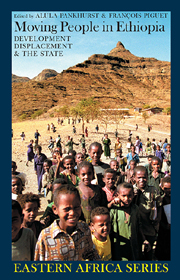Book contents
- Frontmatter
- Contents
- Acknowledgements
- Acronyms
- Glossary
- Notes on Contributors
- Preface: An Original Contribution to Country-wide Displacement Analysis
- Foreword by Alula Pankhurst & François Piguet
- Map
- Part I INTRODUCTION
- Part II THEORETICAL & INTERNATIONAL PERSPECTIVES
- 2 Refugees & Forced Resettlers
- 3 Why Do Things Often Go Wrong in Resettlement Projects?
- Part III DEVELOPMENT-INDUCED DISPLACEMENT
- Part IV THE EXPERIENCE OF STATE-ORGANIZED RESETTLEMENT
- Part V THE DILEMMAS OF REFUGEES, RETURNEES & DISPLACED GROUPS
- Part VI CONCLUSION
- Bibliography
- Index
- EASTERN AFRICAN STUDIES
2 - Refugees & Forced Resettlers
from Part II - THEORETICAL & INTERNATIONAL PERSPECTIVES
Published online by Cambridge University Press: 05 April 2013
- Frontmatter
- Contents
- Acknowledgements
- Acronyms
- Glossary
- Notes on Contributors
- Preface: An Original Contribution to Country-wide Displacement Analysis
- Foreword by Alula Pankhurst & François Piguet
- Map
- Part I INTRODUCTION
- Part II THEORETICAL & INTERNATIONAL PERSPECTIVES
- 2 Refugees & Forced Resettlers
- 3 Why Do Things Often Go Wrong in Resettlement Projects?
- Part III DEVELOPMENT-INDUCED DISPLACEMENT
- Part IV THE EXPERIENCE OF STATE-ORGANIZED RESETTLEMENT
- Part V THE DILEMMAS OF REFUGEES, RETURNEES & DISPLACED GROUPS
- Part VI CONCLUSION
- Bibliography
- Index
- EASTERN AFRICAN STUDIES
Summary
There has been a growing tendency, over the past few years, in both academic and policy circles, for refugees to be mentioned alongside ‘other forced migrants’, almost as though these were interchangeable categories. This is consistent with another noticeable development within the refugee studies field – the growing use of the term ‘forced migration’ to describe the scope of its interests and activities. Consider, for example, the Refugee Studies Centre, in Oxford, with its Summer School and its masters degree, both in ‘Forced Migration’, and its periodical publication, Forced Migration Review, which developed from the earlier publication, Refugee Participation Network Newsletter. Consider also the professional association of the refugee studies community, which has given itself the name ‘International Association for the Study of Forced Migration’. And consider the recently established research and teaching programmes at the University of the Witwatersrand in Johannesburg and at the American University in Cairo, which have called themselves ‘Forced Migration Studies’ and ‘Refugee and Forced Migration Studies’ respectively. Consider, finally, three recent publications by leading scholars of, respectively, international relations, law and international migration: Gil Loescher (2000), Anne Bayefski and Joan Fitzpatrick (eds.) (2000), and Susan Martin (2000).
- Type
- Chapter
- Information
- Moving People in EthiopiaDevelopment, Displacement and the State, pp. 23 - 34Publisher: Boydell & BrewerPrint publication year: 2009



